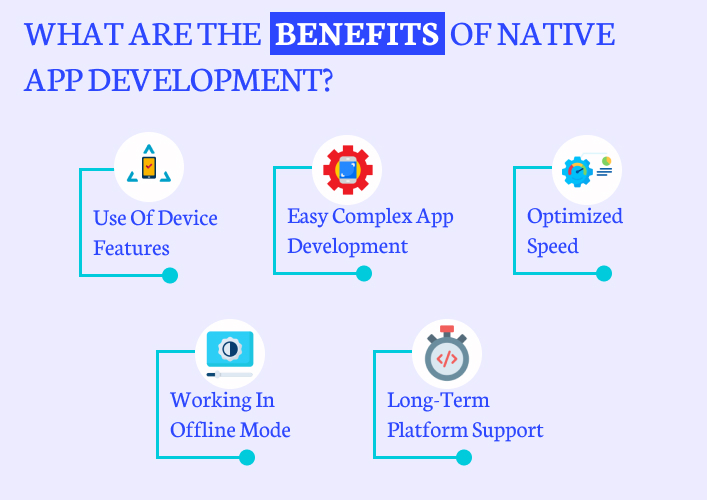What are native apps?
Native apps are mobile applications that have been developed using the OS’s own programming tools and languages. These applications are as opposed to online or hybrid apps. They are built to make use of the unique characteristics of a single operating system like iOS or Android, rather than trying to work across many platforms.
To create a truly native app, developers must use the platform’s native programming languages. For iOS applications, you may use Swift or Objective-C, while Android apps can use Java or Kotlin. Developers may make use of the device’s hardware features like the camera, GPS, and accelerometer by writing their programs in one of these native languages and using one of these native frameworks.
Native app development often requires distinct development efforts for each target platform due to the substantial differences between iOS and Android in terms of codebase and implementation. When compared to cross-platform options, this may lengthen development cycles and raise costs. However, for applications where platform optimization and user engagement are critical, the advantages of native app development, like speed, user experience, and access to platform-specific capabilities, frequently outweigh these concerns. Let’s know the advantages of native app development in detail.
What are the benefits of native app development?

Use of Device Features
A native app development environment is optimized for the features and specifications of a certain operating system, such as the ability to respond to gestures and convenience options like swipes and motions. It also includes the proper placement of the app’s header. As a result, users may get right into using the app, since they are familiar with the functions of their smartphone.
Easy Complex App Development
Native app development is frequently the preferable option for creating complicated apps that need flawless interaction with device-specific features and capabilities. By using the OS’s native application programming interface (API) and features, building a native app unlocks the system’s full potential. The development of sophisticated features like enhanced camera capabilities, GPS navigation, augmented reality, and more is made possible by the device’s tight connection with its hardware and software.
Optimized Speed
Native apps can run faster than hybrid apps. Due to this simplified access to devices’ hardware, processes may be carried out more quickly and efficiently. Furthermore, The native rendering of all components and animations ensures a smooth and quick experience for the user.
Working in Offline Mode
Since native applications can save and retrieve information right away, they can work even when the device is not connected to the internet. When a user installs a native program from an app store, the app stores a lot of its information and assets locally on the user’s device.
Long-Term Platform Support
Constant support and upgrades from platform providers are a major perk of native app development. Companies like Apple and Google, which create operating systems, routinely provide updates to their software and add new features to their products in an effort to remain competitive. To take advantage of the newest innovations, native app developers may easily adapt and incorporate these new OS versions and features into their apps. Furthermore, by keeping up with OS updates, programmers can guarantee that their software runs smoothly on the most cutting-edge mobile devices.
Which technologies are used for native app development?
Several widely-used frameworks exist for creating native apps. Here are a few of the most popular:
- Swift is used for creating apps for iOS, macOS, watchOS, and tvOS. It is the language of choice for creating native iOS applications. Also, the creation of iOS apps often takes place using Objective-C, an older programming language. Although Swift has taken over as Apple’s preferred language for new iOS development, Objective-C is still extensively used and maintained.
- The standard language for creating Android apps has always been Java. It provides an extensive collection of resources for creating Android applications that run natively on the device. Kotlin is a cutting-edge programming language with complete Android app development capabilities. Google has officially endorsed it as the language of choice for creating Android applications.
Conclusion
There are many advantages to developing native apps for both businesses and end users. It paves the way for a more streamlined and enjoyable experience for the user, as well as better performance and access to the full potential of the device. Businesses and developers continue to choose native app development in light of the growth of mobile devices and the ever-increasing expectations for app quality.
However, there are a few things to keep in mind before diving into native app development. Your needs, available resources, audience, and deadlines will determine whether you should develop a native, hybrid, or web app. The time and money needed to create a native app might be much higher because of the need for knowledge of many programming languages and platforms. Thus, it is wise to work with an experienced mobile app development company that provides development at a cost-effective rate.
FAQs
When comparing a web app to a native app, what should you keep in mind?
To create a native app, how long does it typically take?
What is the best platform for creating native apps?
Can I share code across native applications developed for iOS and Android?
How can I ensure the security of a native app?
Shivangi is a passionate Copywriter at Alian Software with expertise in technical copywriting. She shares information that is easy to understand regarding business, technology, and trends.